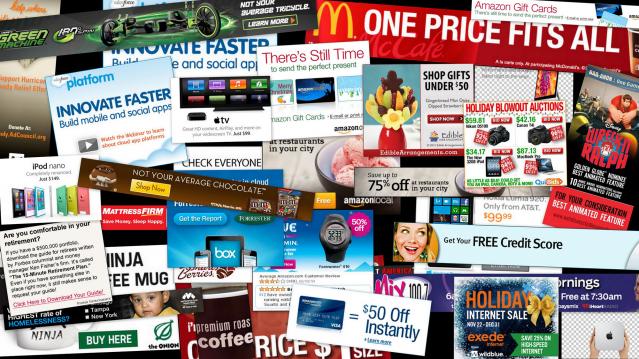The Amount of Money Lost to Ad-Blocking Is Skyrocketing

Are you annoyed by online pop-up ads or those video commercials that automatically start playing when you visit a new Web page? Worried about advertisers collecting your personal information online? You’re not alone. In the perpetual cat and mouse game between marketers and Internet users, the utilization of ad-blocking software by Web surfers is growing rapidly — and it’s costing advertisers billions.
Ad-blocking technology was employed by 45 million active users during the second quarter of 2015, a new report by PageFair and Adobe found. This represents 16 percent of the U.S. online population. In the past year, the number of users blocking ads grew by 48 percent.
In 2014, ad-blocking in the U.S. cost an estimated $5.8 billion in lost advertising revenue. That figure is expected to jump to $10.7 billion in 2015 and $20.3 billion in 2016 as more users adopt the practice. The new version of Apple’s mobile operating system coming this fall is expected to make the problem worse, since it will allow iPhone users to block ads in Safari with a simple app.
In addition to lost revenue, ad-blocking skews the demographics of the online audience. Websites that cater to younger users — a demographic advertisers are eager to target — are the ones most significantly affected by ad-blocking.
Related: The Future of Advertising: Everything, Everywhere, All the Time
A survey in the PageFair/Adobe report found that the main reason individuals block ads is a concern about advertisers mishandling personal data.
Advertisers have a long way to go when it comes to trust. An article in AdAge argues that marketers should be more transparent about the ways they use the information they collect. It recommends giving users more control of their personal data, the ability to decide how much information to share and the choice to opt-out at any time.
Trust isn’t the only issue, though. The appeal of ad-blocking is growing as “malvertising” attacks become more common. Last month, Yahoo’s ad network was targeted for seven days by hackers who sent out corrupt bits of code through Flash-based ads to visitors on Yahoo’s popular sites. Some users were redirected to sites that paid the hackers for traffic, while others had their computers locked for ransom.
Top Reads from The Fiscal Times:
- Bush Looks to Make Up for Past Blunders on Iraq Policy
- Oil Sector Insiders Signal It’s Time to Buy
- How a Soaring Dollar Forced China to Devalue Its Currency
Increasing Number of Americans Delay Medical Care Due to Cost: Gallup

From Gallup: “A record 25% of Americans say they or a family member put off treatment for a serious medical condition in the past year because of the cost, up from 19% a year ago and the highest in Gallup's trend. Another 8% said they or a family member put off treatment for a less serious condition, bringing the total percentage of households delaying care due to costs to 33%, tying the high from 2014.”
Number of the Day: $213 Million

That’s how much the private debt collection program at the IRS collected in the 2019 fiscal year. In the black for the second year in a row, the program cleared nearly $148 million after commissions and administrative costs.
The controversial program, which empowers private firms to go after delinquent taxpayers, began in 2004 and ran for five years before the IRS ended it following a review. It was restarted in 2015 and ran at a loss for the next two years.
Senate Finance Chairman Chuck Grassley (R-IA), who played a central role in establishing the program, said Monday that the net proceeds are currently being used to hire 200 special compliance personnel at the IRS.
US Deficit Up 12% to $342 Billion for First Two Months of Fiscal 2020: CBO

The federal budget deficit for October and November was $342 billion, up $36 billion or 12% from the same period last year, the Congressional Budget Office estimated on Monday. Revenues were up 3% while outlays rose by 6%, CBO said.
Hospitals Sue to Protect Secret Prices

As expected, groups representing hospitals sued the Trump administration Wednesday to stop a new regulation would require them to make public the prices for services they negotiate with insurers. Claiming the rule “is unlawful, several times over,” the industry groups, which include the American Hospital Association, say the rule violates their First Amendment rights, among other issues.
"The burden of compliance with the rule is enormous, and way out of line with any projected benefits associated with the rule," the suit says. In response, a spokesperson for the Department of Health and Human Services said that hospitals “should be ashamed that they aren’t willing to provide American patients the cost of a service before they purchase it.”
See the lawsuit here, or read more at The New York Times.
A Decline in Medicaid and CHIP Enrollment

Between December 2017 and July 2019, enrollment in Medicaid and the Children's Health Insurance Program (CHIP) fell by 1.9 million, or 2.6%. The Kaiser Family Foundation provided an analysis of that drop Monday, saying that while some of it was likely caused by enrollees finding jobs that offer private insurance, a significant portion is related to enrollees losing health insurance of any kind. “Experiences in some states suggest that some eligible people may be losing coverage due to barriers maintaining coverage associated with renewal processes and periodic eligibility checks,” Kaiser said.


